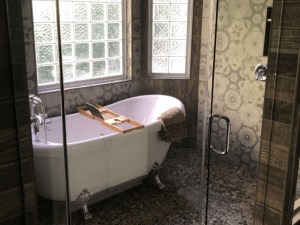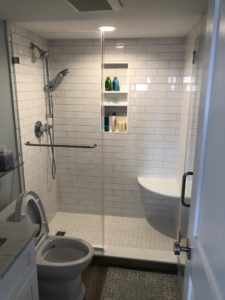That Drip Isn’t Harmless: Here’s What It Could Really Cost You
If there’s one thing I’ve learned over the years working on tile showers here in Maryland, it’s this: a small leak can lead to a big mess. What starts as a little water on the floor or a faint mildew smell can quickly turn into rotted floors, damaged drywall, and thousands of dollars in repairs. The worst part? Most of it could’ve been avoided with early detection.
And here’s the thing about water, it doesn’t stay where you expect it to. It travels. It seeps. It hides. By the time you see stains on the ceiling or mold on the baseboards, the damage is already well underway.
So how do you know when it’s time to bring in a tile installer? Let’s break it down.
Why It’s Easy to Miss a Leak
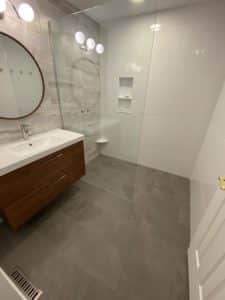
Maryland homeowners face some sneaky challenges when it comes to spotting shower leaks. The humid summers can mask the signs. That mildew smell? It’s easy to blame on poor ventilation. Many people assume some moisture is normal in a bathroom, and that’s where problems begin.
But here’s the truth: your shower should be completely sealed. Water should stay inside the waterproofing system and go directly down the drain. If moisture is finding its way into walls, floors, or ceilings, you’ve got a problem.
Subtle Signs That Often Go Unnoticed:
-
Yellow or brown stains on ceilings below the bathroom
-
That stubborn musty smell that won’t go away
-
Cracked grout or peeling caulk
-
Soft or bouncy floors near the shower
-
Mildew that returns no matter how much you clean
If you’re noticing any of these, it’s time to get it checked out.
7 Clear Signs It’s Time to Call a Tile Pro
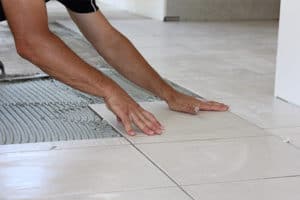
1. Water Stains on Ceilings or Walls
Brown spots on the ceiling? That’s water that’s traveled down from the bathroom, and it means the leak has been active for a while.
2. Loose or Hollow-Sounding Tiles
If your tiles sound hollow when you tap them or feel loose underfoot, moisture has likely weakened the adhesive underneath. That’s not just cosmetic. It’s a red flag.
3. Mold or Mildew That Keeps Coming Back
If you clean and the mold comes back fast, it’s not just surface-level. There’s likely moisture behind the tiles feeding it. That’s a health risk on top of a leak issue.
4. Peeling Paint or Wallpaper Nearby
Bathrooms get humid, yes. But if paint or wallpaper is peeling near your shower, it usually means moisture is getting where it shouldn’t.
5. Warped Baseboards or Cabinets
Wood swells when it’s wet. Warping around the baseboards or vanity is a sure sign that water is escaping somewhere.
6. Persistent Musty Smell
You know that damp, basement-like odor? That’s often mold growing in hidden places. If you smell it, don’t ignore it.
7. Pooled Water Around the Shower
Water pooling outside your shower means your waterproofing system has failed. This needs immediate attention.
How Grout and Caulk Can Lead to Big Problems
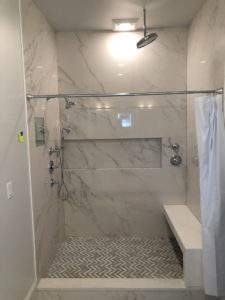
Think of grout and caulk like the “front line” of defense. If they’re cracked, worn out, or missing, water will find a way through. In Maryland, with our freeze-thaw cycles, grout can crack over time. Caulk breaks down even faster, especially in areas that move like corners and edges.
That’s why I always recommend inspecting your shower every few months. Look for:
-
Cracks or gaps in grout lines
-
Discoloration or mold in the grout
-
Caulk pulling away from the tile or looking brittle
Don’t wait until water finds its way behind the wall.
What Happens If You Ignore a Shower Leak?
Let’s break it down by timeline:
First Month:
Water starts soaking into the drywall or subfloor. You won’t always see it yet, but damage is already starting.
Six Months:
Wood begins to rot. Mold spreads behind the walls. Repairs get more expensive. Electrical systems can even be affected.
One Year:
You’re likely looking at a full bathroom gut job. Mold remediation, structural repairs, and possibly even issues with insurance coverage if they determine the problem was ignored.
And let’s not forget the health side of things. Mold isn’t just a smell. It’s a serious issue, especially for kids, seniors, or anyone with allergies.
Why DIY Fixes Usually Don’t Cut It
I’ve seen a lot of homeowners try to fix leaks themselves. And while I understand the desire to save money, most DIY fixes only cover up the symptoms. Re-caulking over moldy joints or replacing a tile without addressing the waterproofing underneath just delays the real solution.
Here’s the part many people miss: the waterproofing is behind the tile, not on the surface. If water got past the grout or tile, it’s already deeper than you can reach with a tube of caulk.
Professional tile installers like us use moisture meters, thermal cameras, and a full inspection process to find and fix the real problem — not just the surface issue.
What a Pro Tile Installer Actually Does to Fix It
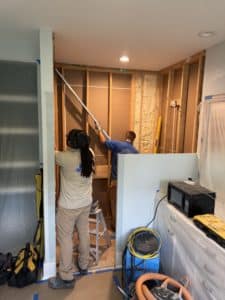
Here’s what we do when we’re called in:
-
Full visual inspection – We check every part of the shower, tile, grout, and caulk.
-
Moisture testing – We use pro tools to see what’s going on behind the walls or floor.
-
Thermal imaging – To detect hidden leaks without opening things up unnecessarily.
-
Shower pan testing – To check if the shower base itself is leaking.
-
Plumbing checks – Sometimes it’s the plumbing, not the tile. We rule that out too.
Based on what we find, we either repair the affected area or, if it’s more serious, rebuild the waterproofing system from scratch.
What Makes a Good Waterproof Shower System?
A leak-proof shower isn’t just about grout and tile. It’s a full system:
-
A pre-sloped floor so water drains properly
-
Waterproofing membranes behind the tile
-
Proper sealing around pipes, benches, niches, and corners
-
Movement joints to handle expansion and shifting
And in Maryland, we need systems that can handle both humid summers and cold winters. That means using flexible, high-performance products that are made to last.
Choosing the Right Tile Installer in Maryland
Don’t just go with the lowest quote. Ask questions:
-
How much experience do you have with shower rebuilds or waterproofing?
-
What waterproofing system do you use, and why?
Look for a contractor who’s not just installing tile but who understands what’s happening behind it.
Bottom Line
If your shower is leaking, even a little, don’t wait. Water damage gets worse with time, not better. Whether it’s soft grout, loose tiles, or a musty smell that won’t quit, it’s worth getting it checked out.
We’re proud to help Maryland homeowners protect their bathrooms (and their budgets) by catching leaks early and fixing them right the first time. Contact Tile Mechanics Corp today to schedule your free consultation.


